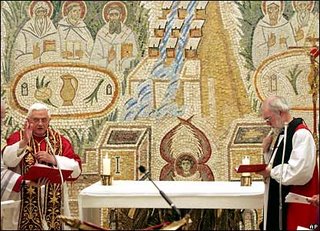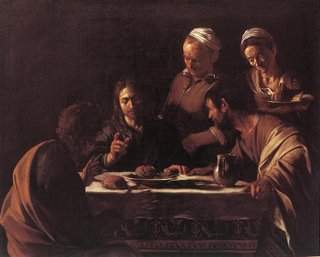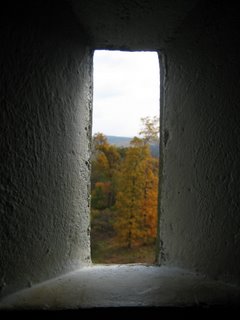One, holy, catholic, apostolic...

Now I say to you that you are Peter (which means ‘rock’), and upon this rock I will build my church, and all the powers of hell will not conquer it.
Matthew 16:18
Therefore I, a prisoner for serving the Lord, beg you to lead a life worthy of your calling, for you have been called by God. Always be humble and gentle. Be patient with each other, making allowance for each other’s faults because of your love. Make every effort to keep yourselves united in the Spirit, binding yourselves together with peace. For there is one body and one Spirit, just as you have been called to one glorious hope for the future. There is one Lord, one faith, one baptism, and one God and Father, who is over all and in all and living through all.
Ephesians 4:1-6
The Word of the Lord.
THANKS BE TO GOD!
 I am grateful for the meeting several weeks ago between Pope Benedict and the Archbishop of Canterbury, Rowan Williams. In recent days, Pope Benedict has traveled to Turkey. While his presence was met with protests and demonstrations from the Muslim community, it would seem to be an attempt to work toward unity, reconciliation and understanding with those outside the Roman Catholic communion. He met with Ecumenical Patriarch Bartholomew. He also prayed with a Muslim cleric.
I am grateful for the meeting several weeks ago between Pope Benedict and the Archbishop of Canterbury, Rowan Williams. In recent days, Pope Benedict has traveled to Turkey. While his presence was met with protests and demonstrations from the Muslim community, it would seem to be an attempt to work toward unity, reconciliation and understanding with those outside the Roman Catholic communion. He met with Ecumenical Patriarch Bartholomew. He also prayed with a Muslim cleric.My hope is buoyed when I see a spirit of humility expressed in the Church, one that seeks reconciliation and healing for past wounds and divisions. I have come to faith in Jesus Christ and have been nurtured in the faith within a Christian faith tradition that does not arise out of sacramental union with the church catholic. Rather, our communion is based on the “believers church” model of those who have chosen to be baptized into Christ and are seeking to follow in the way of Christ. The restorationist ecclesiology is distinct from the sacramental one of Roman Catholicism, Eastern Orthodoxy, and mainline Protestant communions.
 The sacramental center is not one that is created through our varying degrees of faithful response to the Gospel. The church is not as far removed from the world as has perhaps been envisioned by my non-conformed Anabaptist forbears.
The sacramental center is not one that is created through our varying degrees of faithful response to the Gospel. The church is not as far removed from the world as has perhaps been envisioned by my non-conformed Anabaptist forbears.In more recent months and years, I have grown to appreciate the ontological unity of the body of Christ that is expressed in the communion of saints and sinners throughout time and space. This is a mystery! At this point on the journey, I can say that the main tangible outworking in my own life is a deeper appreciation for the fullness of the Church—one, holy, catholic and apostolic. I am reticent to see myself as part of the true church over and against those who worship God and seek to follow him within other traditions. I am seeking to connect the faith and practice of my Anabaptist stream with the whole of Christianity. Anabaptist distinctives are only meaningful when connected to the unified whole.
The Church that I am a part of is not only that of my own faith tradition, but in some mysterious way…the church of Pope Benedict, Patriarch Bartholomew, and Archbishop Rowan Williams.

I resonate with the wanderlust of the emergent church, with it’s missional quest. However, I have questions about the eclectic picking and choosing from the classical Christian tradition and contemporary, creative/innovative forms. While noble, this seems to be an attempt to recapitulate vintage pre-modern Christianity into the ethos of postmodernity, albeit sometimes without a rubric for discerning Biblical, historical patterns of worship. The starting from scratch mentality, like artists in a new era with a blank canvas.
Modernity squeezed Western Christianity into its rationalistic mold. The arts, mystery, the organic expressions of mission diminished in many places. I see the emergent church attempting to make space for worship, community and mission in line with Christian tradition, but with a high value on embodying the gospel in communal ways in a postmodern, post-Christendom cultural context. This is good as long as it is tempered by a humility that seeks to preserve the unity of the faith. Are there accountability points? Or is it just everyone for themselves.
I cringe at times when I pick up on a bit of a hubris towards the Church of antiquity (which for postmoderns, includes the modern era of denominations and generic non-denominational streams). I get the sense sometimes, that there is a patronizing view toward the church stuck in passé expressions of Christianity from bygone eras. “Last person out of the Church turn out the lights” becomes the de facto posture toward the establishment church. I am hesitant to see the Church segmented so easily. That is not the spirit I see represented in the prayer of Jesus in John 17, or the Ephesians passage on the unity in the body.
Dwight Longenecker has an excellent post (November 25) on the wisdom of expressing our voice in the affirmative, rather than the negative.
Is it possible to express our voice, our witness, our faith in such a way that honors the other parts of the body, beyond our tradition? May God give us the grace and courage to come to the table he has prepared for us in the Kingdom. May we have the courage to acknowledge our differences. May we be humble and gentle. May we be patient with each other, making allowance for each other’s faults. And may we make every effort to keep ourselves united in the Spirit, binding ourselves together with peace.
For there is one body and one Spirit. There is one Lord, one faith, one baptism, and one God and Father, who is over all and in all and living through all.
Questions:
What is the basis of our communion?
To whom are we accountable in our faith and practice?
What is the test of our faithfulness to Scripture? It seems good to the Holy Spirit and to us...but who all do we include in the "us"?
How big is our hermeneutical community?
What happens when we major on missiology and minor on ecclesiology?
For those in the "free church" tradition, what are the sources we look to in confirming our faith and beliefs?
Might the proliferation of independent groups, networks, and movements reflect an undercurrent of individualism that arises out of the Enlightenment? To whom are all these expressions of Church accountable? Just because I call myself an abbott, an apostle, etc. does that mean anything, if I am not in submission to the Church? The individualism that gives rise to "God told me" and that settles it is not the way we see the Church operating throughout history.
Or if we are postmodern enough to deconstruct all authority, what will guard us from falling into the abyss of subjectivism, looking only through the lens of our own experience, our reason, our democratic group processes that hopefully lead to consensus?
Enough questions for now...
I welcome your contributions.
Labels: catholic, ecclesiology, emerging church, postmodern




















